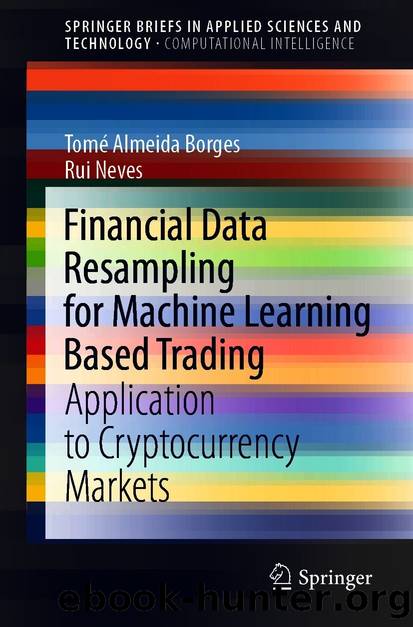Financial Data Resampling for Machine Learning Based Trading by Tomé Almeida Borges & Rui Neves

Author:Tomé Almeida Borges & Rui Neves [Borges, Tomé Almeida & Neves, Rui]
Language: eng
Format: epub
ISBN: 9783030683795
Amount: The purpose of this type of rearrangement is to sample data according to a fixed variation threshold rather than to a fixed percentage or time period. This process is identical to the Percentage rearrangement but is even simpler. Instead of calculating the percentual first order difference between closes, simply the actual first order difference series of the closing values is calculated. As was mentioned in Sect. 2.â3.â1, the first order difference of the close series corresponds to the changes from the close of an actual data point with its immediate previous data point and has the added benefit of achieving (or approaching) stationarity.
All procedures for calculating the alternative cumulative sum column, for assignment of new group identifiers and sample grouping are identically followed throughout the remainder of this resampling process. The only exception is the fixed threshold and how it is determined. In this case, a fixed price value is used as threshold instead. This fixed value corresponds to a fixed closing price variation of the base currency expressed in units of quote currency. To obtain this fixed value, firstly, the sum of absolute differences between closes is calculated, i.e., Sum(abs(differencing(closeprices))). The value obtained is divided by the total number of data points obtained in the percentage grouping. This procedure guarantees that the quantity of data points obtained is similar to the quantity obtained in percentage grouping. Nonetheless it is unlikely that the final amount of samples obtained correspond precisely to the amount of samples obtained in the first rearrangement. These two types of resampling procedures group samples according to different variations which may phase themselves differently resulting in less groups during the customized cumulative sum group identifier assignment process and consequently less samples in the final dataset. Anyhow, this is not a frequent occurrence and the total sample difference between this rearrangement and the percentage rearrangement is never substantial (it is never larger than 1% of the total amount of samples of each rearrangement). In the end, likewise to the percentage rearrangement, the same amount of closing price action, is approximately the identical for each candlestick.
Download
This site does not store any files on its server. We only index and link to content provided by other sites. Please contact the content providers to delete copyright contents if any and email us, we'll remove relevant links or contents immediately.
| Arithmetic | Counting & Numeration |
| Pre-Calculus |
Modelling of Convective Heat and Mass Transfer in Rotating Flows by Igor V. Shevchuk(6422)
Weapons of Math Destruction by Cathy O'Neil(6250)
Factfulness: Ten Reasons We're Wrong About the World – and Why Things Are Better Than You Think by Hans Rosling(4725)
A Mind For Numbers: How to Excel at Math and Science (Even If You Flunked Algebra) by Barbara Oakley(3288)
Descartes' Error by Antonio Damasio(3263)
Factfulness_Ten Reasons We're Wrong About the World_and Why Things Are Better Than You Think by Hans Rosling(3224)
TCP IP by Todd Lammle(3170)
Fooled by Randomness: The Hidden Role of Chance in Life and in the Markets by Nassim Nicholas Taleb(3097)
Applied Predictive Modeling by Max Kuhn & Kjell Johnson(3053)
The Tyranny of Metrics by Jerry Z. Muller(3051)
The Book of Numbers by Peter Bentley(2957)
The Great Unknown by Marcus du Sautoy(2680)
Once Upon an Algorithm by Martin Erwig(2639)
Easy Algebra Step-by-Step by Sandra Luna McCune(2620)
Lady Luck by Kristen Ashley(2569)
Police Exams Prep 2018-2019 by Kaplan Test Prep(2531)
Practical Guide To Principal Component Methods in R (Multivariate Analysis Book 2) by Alboukadel Kassambara(2530)
All Things Reconsidered by Bill Thompson III(2382)
Linear Time-Invariant Systems, Behaviors and Modules by Ulrich Oberst & Martin Scheicher & Ingrid Scheicher(2357)
